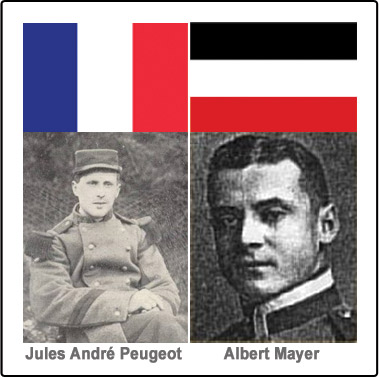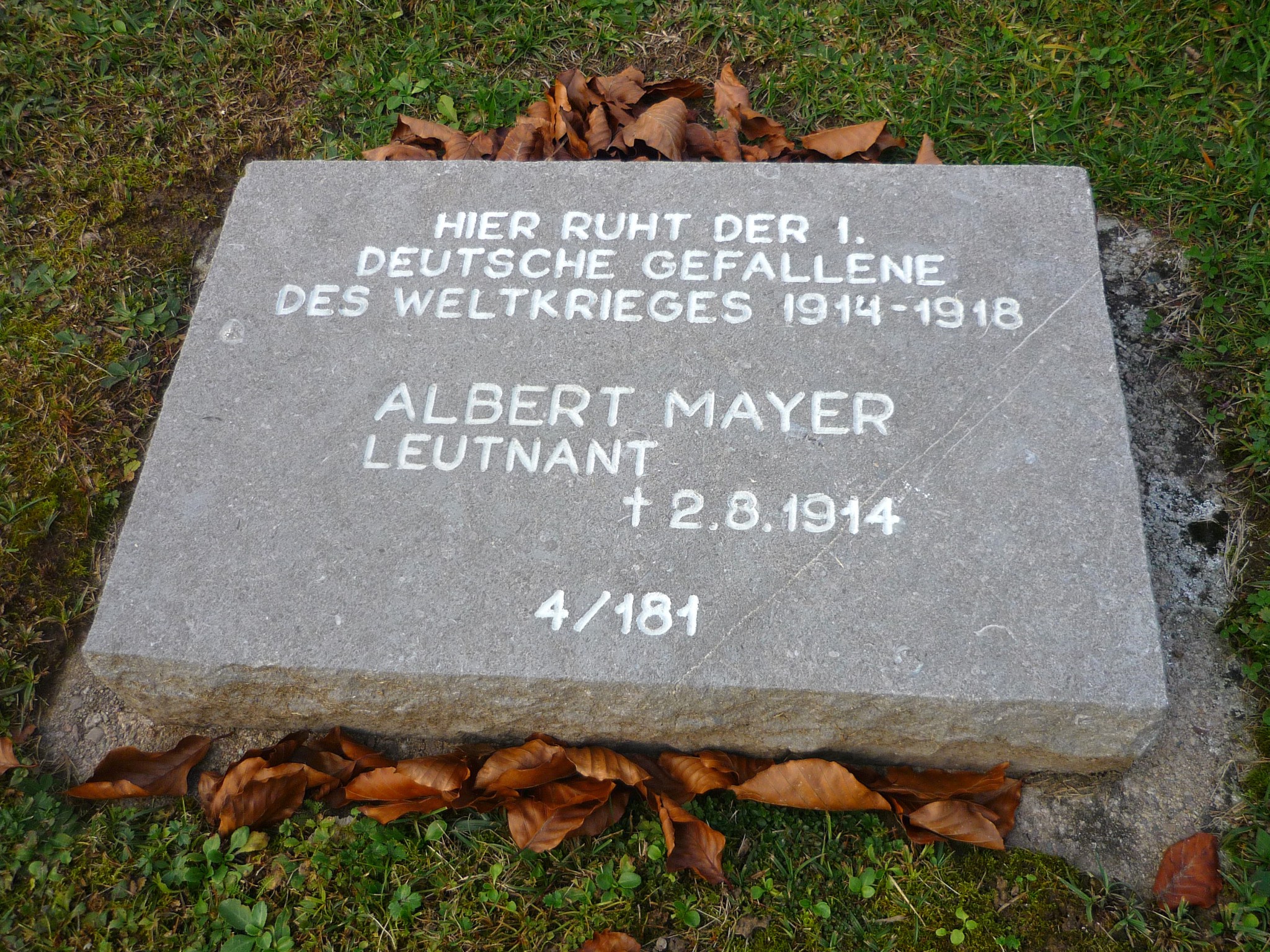With a bit of research we found out the names of the first soldiers who fell during the First World War.
When World War I started exactly 100 years ago, the first military action of the Western Front led to the war’s first military casualties. On the 2nd August 1914, 30 hours before the declaration of war on France by Germany, a German and a French soldier were recorded as being the first persons to die in the Great War. Here is a brief account of the Skirmish of Joncherey which took place near the French-German border at the most southern sector of the Western Front.
The Skirmish of Joncherey
On August 2, 1914 at around 6am, German Leutnant Albert Mayer and his small cavalry patrol ventured across the border, violating French territory.
In the meantime, French corporal Jules André Peugeot and his squad were stationing in the billet house at the village of Joncherey located not far from the border with Alsace, then part of Germany.
At the approach of the Germans, the alert was given by the owner’s daughter of the house who came back inside saying:
“The Prussians! The Prussians are coming!”
Immediately Peugeot and three other French soldiers came out to arrest the Germans near the Docourt Farm. Upon meeting them at 10am, Albert Mayer opened fire with his revolver wounding Peugeot on his shoulder. While falling, the French soldier had time to fire back although missing the German patrol commander. The three other French soldiers in turn succeeded killing Mayer with pistols. Corporal Peugeot went back to the billet house where he died at 10.37am.

The two bodies were put in a barn side by side on a bed of straw. Jules André Peugeot was 21 year old and Albert Mayer had just turned 22.
Albert Mayer was the first soldier to die in WWI. A native from Magdeburg, his family had moved to Mulhouse where he stationed at the outbreak of the war. Lieutenant Mayer was buried in the Soldatenfriedhof at Illfurth in southern Alsace.
Corporal Peugeot was the first French soldier to be killed in the Great War and was buried in the family plot at Étupes (département of Doubs).
A Memorial remembering the tragic event and dedicated to Jules André Peugeot still stands in the village of Joncherey.
The Illfurth Deutscher Soldatenfriedhof
Located in the woods a short distance outside the village of Illfurth in southern Alsace, the war cemetery contains the graves of 1,964 German soldiers and officers who fell during the First World War.
A twisting path leads towards the woods to the cemetery built upon a rather steep slope of a hill. 539 flat stone slabs representing the graves of identified German soldiers are aligned in rows across the steep laws.
The other 510 unidentified dead soldiers are contained within the ossuary placed underneath an imposing statue of the Imperial Eagle (Illfurth Fliegerdenkmal).
The statue was placed as a Memorial to the German aviators and a bronze plaque bears the following inscription:
“Here rest the fallen team of the Flieger Abteilung 48′ airplane on the 18th March 1916.
Walther Kurt – Reserve Second Lieutenant
Fritz Hopfgarten – Deputy Officer
Max Wallat – Staff Sergeant
They died on this location (ie Habsheim) after a heroic air fight against a French squadron.
Erected by their comrades, April 1916″
A couple of other Memorials commemorate the bravoure of German regiments: the Bavarian Landwehr Infanterie Regiment 15 (B.L.I.R. 15) and the Landwehr Regiment 123.
The cemetery was first laid out in April 1920 when the soldiers’ corpses originally buried in the surrounding region were gathered into a same site.
There can be seen the grave of Leutnant Albert Mayer of the 5th Jager zu Pferd, the first German soldier killed in WWI during the Joncherey Skirmish.

English-French Vocabulary
(f) for féminin, (m) for masculin, (adj) for adjective and (v) for verbs
- army = armée (f)
- border = frontière (f)
- casualty = victime (f)
- cemetery = cimetière (m)
- commander = commandant (m)
- corporal = caporal (f)
- death = mort (f)
- to die = mourir (v)
- First World War = Première Guerre Mondiale (f)
- German = Allemand (m) / Allemande (f)
- Germany = Allemagne (f)
- grave = tombe (f)
- Great War = Grande Guerre (f)
- Imperial Eagle = Aigle Impérial (m)
- to kill = tuer (v)
- memorial = mémorial (m)
- ossuary = ossuaire (m)
- patrol = patrouille (f)
- skirmish = escarmouche (f)
- soldier = soldat (m)
- war = guerre (f)
- Western Front = Front de l’ouest (m)
- World War I = Première Guerre Mondiale (f)


